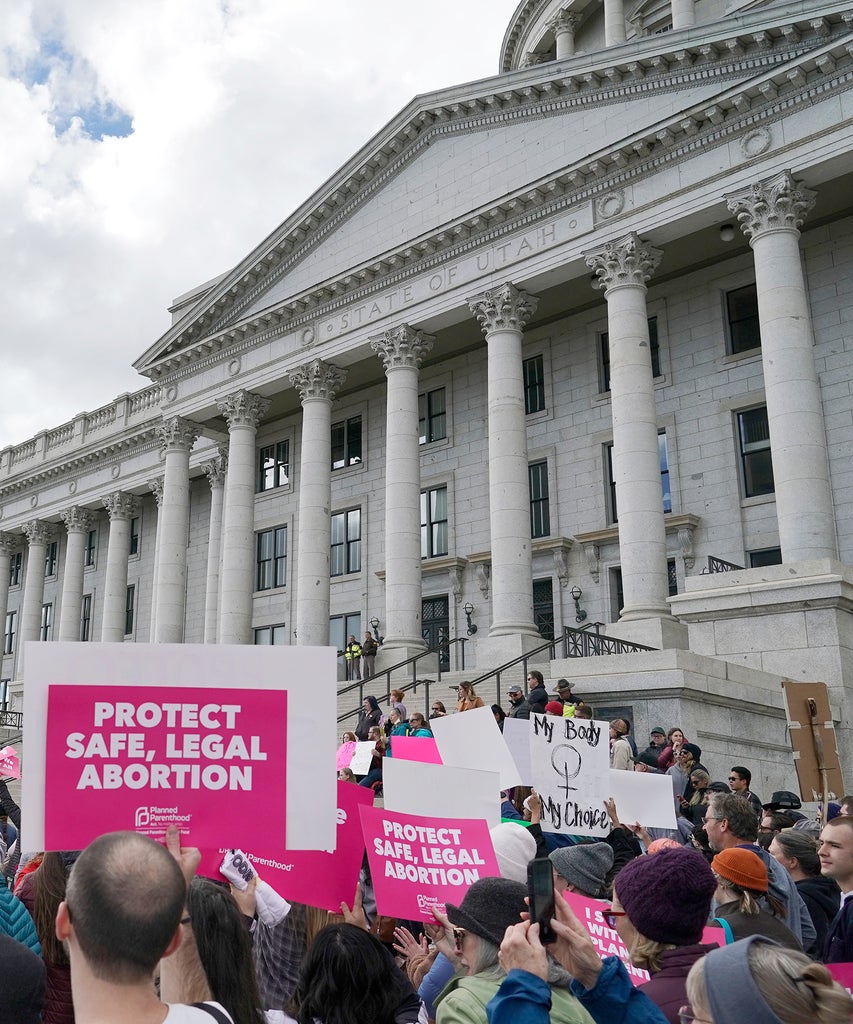
The article is being updated as more news about temporary injunctions and restraining orders impacting abortion access comes out. It was originally published on June 28.
Chaos and clinic-closing ensued after the Supreme Court overturned Roe v. Wade, which protected a person’s right to choose abortion, last Friday. The decision means that individual U.S. states now have the power to decide whether their residents can access abortion. Thirteen of them had “trigger laws” on the books, which were essentially abortion bans designed to be “triggered” into effect by Roe’s demise. But abortion providers were ready for this moment, and immediately filed lawsuits to challenge those bans. And so far, they’ve been successful (at least for now) in four states: Utah, Texas, Louisiana, and Kentucky.
In Utah, Third District Court Judge Andrew Stone granted an emergency injunction to Planned Parenthood of Utah and the American Civil Liberties Union of Utah. It’s a 14-day temporary restraining order (TRO) that allowed abortion care to resume there for now. “On Monday, in Utah, one of the reddest states in the country, where the trigger law and its exceptions read the same way that the predominant religion here would have it read, we somehow got a TRO,” Karrie Galloway, CEO of the Planned Parenthood Association of Utah, tells Refinery29.
Meanwhile, in Louisiana, The Center for Reproductive Rights filed a suit on behalf of an abortion clinic in Shreveport, saying the trigger laws were “unconstitutionally vague.” A hearing to determine the future of the laws is scheduled for July 8. By Tuesday, Texas also got an injunction allowing abortions in pregnancies up to six weeks. The next hearing for that will be on July 12.
On Thursday, July 30, a Kentucky judge temporarily blocked the state’s trigger laws by granting a restraining order that allows abortions to resume temporarily, after a request from the American Civil Liberties Union of Kentucky and Planned Parenthood Great Northwest, Hawaii, Alaska, Indiana, Kentucky. A hearing for this will occur on July 6.
Similar actions are being taken in states where there aren’t trigger laws but other bans. In Florida, a judge temporarily blocked a 15-week abortion ban from taking effect, saying the ban is “unconstitutional in that it violates the privacy provision of the Florida Constitution.”
Although it’s unclear how long the stopgaps on the abortion bans will hold, one thing is for sure: They’ll make a definite difference in the lives of hundreds of people who can have abortions in these states between now and the time the restraining orders are revisited in court in early July, says Galloway. “As soon as the judge signed the order in Utah on Monday, we could begin providing abortion care again,” Galloway says. “We had some people who’d waited in our waiting rooms for the potential of that happening.” They’ve helped about 35 people since.
Some of these were people who’d had appointments on Saturday, June 25, the day after Roe was overturned and the trigger ban in Utah went into effect. “These were people who made appointments a week, 10 days ago, because we have so many restrictions on abortion here, including 72-hour waiting periods,” Galloway says. “These people made their decision before the reversal, and we had to tell them they no longer had the right to make that decision.” This was extremely stressful and devastating for both the patients and the staff members, Galloway says.
“The majority of people we see don’t have health insurance,” she adds. “The majority of people who get abortions are already parents. They know what they’re getting into. People don’t make these decisions lightly, and to be told that the decision you made is not available and that someone is taking away your ability to decide things about your own body — I really can’t imagine the amount of frustration you would feel,” she said, adding that low-income and people of colour are often the most affected by such bans.
What does this mean for other states with trigger bans? Ahead of the overturning of Roe, the Guttmacher Intitute predicted 26 states are certain or likely to ban abortion now. Looking ahead, based on many red-state legislatures’ drive to continue to ban abortion, it’s unlikely the temporary ability to carry out abortions in these trigger ban states will last. As the Louisiana Attorney General Jeff Landry (R), who is anti-abortion, said in a statement on Monday: “It is unfortunate that there are those who continue to utilise confusion, misinformation, and deceit as scare tactics in the face of the recent SCOTUS Dobbs decision.”
Meanwhile, Galloway says other states may not be able to get similar injunctions to Utah — at least not using the same arguments — because Utah’s constitution in particular has “a strong recognition of equal rights, noting that laws have to be equitable between men and women.” She hopes other states will find other ways to succeed in legal challenges though, and for now is taking the W.
“It may be a minor, petty victory,” Galloway says. “But, for the rest of the country, I hope it gives them hope that maybe we can figure out — in states that don’t want to respect bodily autonomy where we’ll be starting at ground zero — how to help.”
Like what you see? How about some more R29 goodness, right here?
What U.S. Abortion Access Looks Like Post-Roe